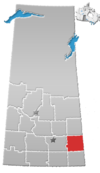Spy Hill
Spy Hill (2016 population: 168) is a village in the Canadian province of Saskatchewan within the Rural Municipality of Spy Hill No. 152 and Census Division No. 5. It is at the intersection of Highway 8 and Highway 600. The community's school closed due to a lack of students, who are now bused approximately 27 km (17 mi) to Langenburg). The Northland Power - Spy Hill Power Plant is located in the community.
History
[edit]Spy Hill incorporated as a village on April 22, 1910.[1]
Demographics
[edit]In the 2021 Census of Population conducted by Statistics Canada, Spy Hill had a population of 173 living in 90 of its 116 total private dwellings, a change of 3% from its 2016 population of 168. With a land area of 1.15 km2 (0.44 sq mi), it had a population density of 150.4/km2 (389.6/sq mi) in 2021.[4]
In the 2016 Census of Population, the Village of Spy Hill recorded a population of 168 living in 87 of its 116 total private dwellings, a -21.4% change from its 2011 population of 204. With a land area of 1.19 km2 (0.46 sq mi), it had a population density of 141.2/km2 (365.6/sq mi) in 2016.[5]
Notable people
[edit]- Jeff Odgers, former NHL player having played with San Jose Sharks, Boston Bruins, Colorado Avalanche, and Atlanta Thrashers
See also
[edit]References
[edit]- ^ "Urban Municipality Incorporations". Saskatchewan Ministry of Government Relations. Archived from the original on October 15, 2014. Retrieved June 1, 2020.
- ^ "Saskatchewan Census Population" (PDF). Saskatchewan Bureau of Statistics. Archived from the original (PDF) on September 24, 2015. Retrieved May 31, 2020.
- ^ "Saskatchewan Census Population". Saskatchewan Bureau of Statistics. Retrieved May 31, 2020.
- ^ "Population and dwelling counts: Canada, provinces and territories, census divisions and census subdivisions (municipalities), Saskatchewan". Statistics Canada. February 9, 2022. Retrieved April 1, 2022.
- ^ "Population and dwelling counts, for Canada, provinces and territories, and census subdivisions (municipalities), 2016 and 2011 censuses – 100% data (Saskatchewan)". Statistics Canada. February 8, 2017. Retrieved May 30, 2020.


